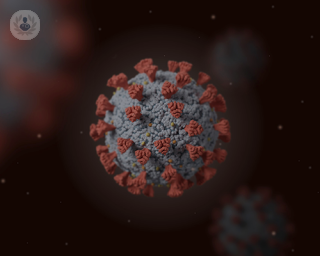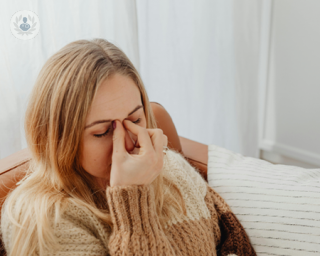What are smell disorders?
Smell disorders, also known as olfactory disorders, are those that result in an increase, decrease, absence or change in our sense of smell. Common smell disorders include:

Anosmia
Anosmia is the medical term for the complete loss or absence of the sense of smell. It occurs when the olfactory system, which includes the olfactory nerve and the brain's processing of odour signals, is compromised, preventing the individual from detecting and identifying scents.
Hyposmia
Hyposmia refers to a partial or diminished sense of smell, where an individual's ability to detect and recognise odours is reduced. Unlike anosmia, which is the complete loss of the sense of smell, hyposmia represents a milder form of olfactory impairment.
It can result from various factors, including nasal congestion, infections, certain medications, or neurological conditions, and it may impact one's enjoyment of food and the ability to detect certain odours, potentially affecting safety awareness.
Congenital anosmia
Congenital anosmia is a rare condition where an individual is born without a sense of smell. Unlike acquired anosmia, which develops later in life, congenital anosmia is present from birth. It can be caused by genetic factors that affect the development of the olfactory system, such as abnormalities in the olfactory nerve or the olfactory bulb.
Individuals with congenital anosmia might not be able to detect or differentiate odours, impacting their experience of taste and their ability to detect certain environmental cues.
Parosmia
Hyposmia refers to a partial or diminished sense of smell, where an individual's ability to detect and recognise odours is reduced. Unlike anosmia, which is the complete loss of the sense of smell, hyposmia represents a milder form of olfactory impairment.
It can result from various factors, including nasal congestion, infections, certain medications, or neurological conditions, and it may impact one's enjoyment of food and the ability to detect certain odours, potentially affecting safety awareness.
Phantosmia
Phantosmia is a sensory phenomenon where individuals perceive phantom smells that are not present in their surroundings. This olfactory hallucination can be disorienting and unsettling, leading individuals to detect odours that may be pleasant or unpleasant, even though there is no actual source of the smell.
Phantosmia can be linked to various factors, including sinus infections, migraines, neurological disorders, or even certain medications. Accurate diagnosis and addressing the underlying cause are crucial for managing this condition and alleviating the distress it may cause.
06-23-2020 08-21-2023Smell disorders
Mr Mamun Rashid - Otolaryngology / ENT
Created on: 06-23-2020
Updated on: 08-21-2023
Edited by: Aoife Maguire
What are smell disorders?
Smell disorders, also known as olfactory disorders, are those that result in an increase, decrease, absence or change in our sense of smell. Common smell disorders include:

Anosmia
Anosmia is the medical term for the complete loss or absence of the sense of smell. It occurs when the olfactory system, which includes the olfactory nerve and the brain's processing of odour signals, is compromised, preventing the individual from detecting and identifying scents.
Hyposmia
Hyposmia refers to a partial or diminished sense of smell, where an individual's ability to detect and recognise odours is reduced. Unlike anosmia, which is the complete loss of the sense of smell, hyposmia represents a milder form of olfactory impairment.
It can result from various factors, including nasal congestion, infections, certain medications, or neurological conditions, and it may impact one's enjoyment of food and the ability to detect certain odours, potentially affecting safety awareness.
Congenital anosmia
Congenital anosmia is a rare condition where an individual is born without a sense of smell. Unlike acquired anosmia, which develops later in life, congenital anosmia is present from birth. It can be caused by genetic factors that affect the development of the olfactory system, such as abnormalities in the olfactory nerve or the olfactory bulb.
Individuals with congenital anosmia might not be able to detect or differentiate odours, impacting their experience of taste and their ability to detect certain environmental cues.
Parosmia
Hyposmia refers to a partial or diminished sense of smell, where an individual's ability to detect and recognise odours is reduced. Unlike anosmia, which is the complete loss of the sense of smell, hyposmia represents a milder form of olfactory impairment.
It can result from various factors, including nasal congestion, infections, certain medications, or neurological conditions, and it may impact one's enjoyment of food and the ability to detect certain odours, potentially affecting safety awareness.
Phantosmia
Phantosmia is a sensory phenomenon where individuals perceive phantom smells that are not present in their surroundings. This olfactory hallucination can be disorienting and unsettling, leading individuals to detect odours that may be pleasant or unpleasant, even though there is no actual source of the smell.
Phantosmia can be linked to various factors, including sinus infections, migraines, neurological disorders, or even certain medications. Accurate diagnosis and addressing the underlying cause are crucial for managing this condition and alleviating the distress it may cause.


Smell disorders: all your questions answered
By Mr Thomas Jacques
2025-01-15
There are a number of different ways in which smells can change. Some people experience a complete loss of the sense of smell, named anosmia. However, for a lot of people some sense of smell remains and it is not as sensitive as it used to be. Partial loss of sense smell is called hyposmia. Patients suffering from smell loss quite often complain of parosmia. Parosmia means there is a distortion of the sense of smell. Common things such as food, drink or perfume start to smell wrong and often quite unpleasant. Less commonly, patients can percieve smells that other people cannot smell. Sometimes they smell an unpleasant smell in their own nose due to sinus problems. Occassionally, some people begin to experience smells that are not there such as the smell of smoke when there is none at all. This is called phantosmia. With smell disorders, quite often the sense of taste is also affected. This is because most of your ability to distinguish between flavours is due to smelling the food that is in your mouth. Your tongue can only detect basic tastes like salt, sour, sweet or bitter. Less commonly, patients can percieve smells that other people cannot smell. Sometimes they smell an unpleasant smell in their own nose due to sinus problems. Occassionally, some people begin to experience smells that are not there such as the smell of smoke when there is none at all. This is called phantosmia. With smell disorders, quite often the sense of taste is also affected. This is because most of your ability to distinguish between flavours is due to smelling the food that is in your mouth. Your tongue can only detect basic tastes like salt, sour, sweet or bitter. See more


COVID and loss of sense of smell (anosmia): who’s likely to get it and how long does it last?
By Professor Carl Philpott
2025-01-14
A loss of smell has proven to be an important aspect in detecting who has COVID-19, but how common is this symptom and who is most likely to experience it? After reading Professor Carl Philpott guidance and advice, you'll be fully in the know. See more


Loss of smell and getting it treated
By Mr Matt Lechner
2025-01-14
Anosmia, or loss of smell, is a condition that requires prompt medical attention due to its impact on quality of life. With appropriate diagnosis and treatment, many individuals can regain or improve their sense of smell, although some cases may result in permanent loss. In this informative article, leading consultant rhinologist and ENT surgeon Mr Matt Lechner provides a specialist's insight regarding effective management of this condition. See more


Losing your sense of smell
By Professor Carl Philpott
2025-01-12
Losing your sense of smell can be problematic for daily life, as well as a sign of more serious issues. Read on to find out more about this condition from top ENT specialist Professor Carl Philpott. See more
Experts in Smell disorders
-
Professor Carl Philpott
Otolaryngology / ENTExpert in:
- Smell disorders
- Taste disorders
- Sinusitis
- Rhinitis
- Blocked nose
- Tonsillitis
-
Mr Deepak Gupta
Otolaryngology / ENTExpert in:
- Sinusitis
- Smell disorders
- Rhinology
- Disorders of nasal breathing
- Snoring
- Paediatric ENT
-
Mr Thomas Jacques
Otolaryngology / ENTExpert in:
- Rhinoplasty (nose job)
- Functional surgery of the nose
- Allergic rhinitis
- Sinusitis
- Smell disorders
- Epistaxis
-
Mr Kristian Hutson
Otolaryngology / ENTExpert in:
- Facial plastic surgery
- Septorhinoplasty
- Skin cancer
- Smell disorders
- Nasal polyps
- Rhinology
-
Mr Robert Almeyda
Otolaryngology / ENTExpert in:
- Septorhinoplasty
- Paediatric ENT
- Allergic rhinitis
- Smell disorders
- Facial plastic surgery
- Skin cancer on face
- See all

The Ridgeway Hospital - part of Circle Health Group
The Ridgeway Hospital - part of Circle Health Group
Moormead Rd, Wroughton, Swindon SN4 9DD
No existe teléfono en el centro.
By using the telephone number provided by TOP DOCTORS, you automatically agree to let us use your phone number for statistical and commercial purposes. For further information, read our Privacy Policy
Top Doctors

The ENT Consultancy
The ENT Consultancy
23 Craven Rd, Reading
No existe teléfono en el centro.
By using the telephone number provided by TOP DOCTORS, you automatically agree to let us use your phone number for statistical and commercial purposes. For further information, read our Privacy Policy
Top Doctors

Shirley Oaks Hospital - part of Circle Health Group
Shirley Oaks Hospital - part of Circle Health Group
Poppy Lane, Croydon CR9 8AB
No existe teléfono en el centro.
By using the telephone number provided by TOP DOCTORS, you automatically agree to let us use your phone number for statistical and commercial purposes. For further information, read our Privacy Policy
Top Doctors
-
The Ridgeway Hospital - part of Circle Health Group
Moormead Rd, Wroughton, Swindon SN4 9DD, SwindonExpert in:
- Breast Cancer
- General Surgery
- Orthopaedic surgery
- Plastic surgery, reconstructive and aesthetics
- Refractive surgery
- Cancer screening clinic
-
The ENT Consultancy
23 Craven Rd, Reading , ReadingExpert in:
- Voice disorders
- Ear infection
- Hearing loss
- Adult and paediatric services
-
Shirley Oaks Hospital - part of Circle Health Group
Poppy Lane, Croydon CR9 8AB, South LondonExpert in:
- General Surgery
- Orthopaedic surgery
- Plastic surgery, reconstructive and aesthetics
- Gastroenterology
- Obstetrics and Gynaecology
- Neurosurgery
- See all
- Most viewed diseases, medical tests, and treatments
- HHT (Hereditary Haemorrhagic Telangiectasia)
- Snoring
- Polysomnography (sleep study)
- Nystagmus
- Migraine
- Minimal access surgery (keyhole surgery)
- Head and neck cancer
- Neck lump
- Botulinum toxin (Botox™)
- Thyroid disorders








